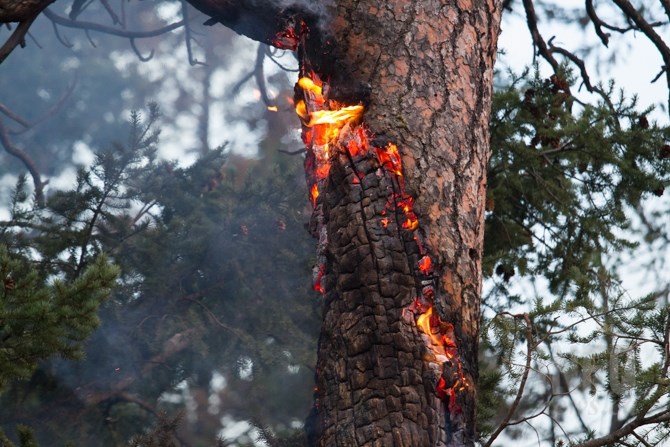
Image Credit: FILE PHOTO
April 04, 2020 - 12:00 PM
Burning is the go-to method for getting rid of unwanted debris from orchards, acreages and forested areas both public and private and it’s not a matter of beautifying open spaces.
West Kelowna fire chief Jason Brolund has stressed the importance of reducing the fuel in fire-prone areas year after year — it’s the best way to create a buffer between forests and urban areas. It’s the easiest way to make sure a fire doesn’t gain uncontrollable speed once lit.
This spring, however, things will be different.
Across B.C. burning bans have been rolled out, meaning no vegetative debris can legally be burned. Brolund said he’s expecting to see a campfire ban go into effect in the days ahead, as well.
The decision to snuff out fires comes as cases of novel coronavirus in British Columbia continue to increase.
“The B.C. Centre for Disease Control recommends implementing measures that help to reduce excess air pollution in populated areas,” the Central Okanagan Regional District said in a recent press release. "Evidence has shown that exposure to air pollution can increase susceptibility to respiratory viral infections by decreasing immune function."
While he supports every effort to guide Canadians through this pandemic safely, Brolund also knows that there’s a good chance we’re trading in one crisis for another.
“Obviously we respect the direction of the province with all the things being done to try and stop COVID-19 in its tracks and we can appreciate how added smoke will make it difficult for those who might, unfortunately, suffer from COVID-19,” he said.
“But it makes it challenging as we deal with another threat on our doorstep — wildfire.”
Because they can’t simply throw up their hands and wish for the best, Brolund and others who turn their attention to the often ignited areas of the valley this time of year will engage in other methods of fuel mitigation.
“Burning is the cheapest, most effective way,” he said. “And this work is done with grant funding, which is very limited.”
Now the plan will centre around getting piles of vegetative waste, hauling it away and chipping it.
“We don’t have an unlimited pot of money… we are trading off the response to one crisis for the response to another and making those decisions isn’t easy.”
In the meantime, Brolund hopes that people who may have more time on their hands and are housebound take the opportunity to do as much fire-smarting on their properties as they can — while, of course, maintaining social distancing measures.
As for what conditions are around the corner, that remains to be seen. The City of West Kelowna have already delivered sand and sandbags to the usual locations for residents to use, but it’s unclear whether there will be floods.
“It is difficult to predict at this point, the snowpack higher on one side of Okanagan Lake, and lower on the west side of Okanagan Lake,” Brolund said.
“And fire season is difficult to predict, too… both are driven by the weather in the next six weeks, and how much rain we get is the determining factor.”
To contact a reporter for this story, email Kathy Michaels or call 250-718-0428 or email the editor. You can also submit photos, videos or news tips to the newsroom and be entered to win a monthly prize draw.
We welcome your comments and opinions on our stories but play nice. We won't censor or delete comments unless they contain off-topic statements or links, unnecessary vulgarity, false facts, spam or obviously fake profiles. If you have any concerns about what you see in comments, email the editor in the link above.
News from © iNFOnews, 2020